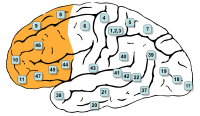
Photo from wikipedia
Humans can rely on diverse sources of information to evaluate others, including knowledge (e.g., occupation, likes and dislikes, education, etc.) and perceptual cues (e.g., attractiveness, race, etc.). Previous research has… Click to show full abstract
Humans can rely on diverse sources of information to evaluate others, including knowledge (e.g., occupation, likes and dislikes, education, etc.) and perceptual cues (e.g., attractiveness, race, etc.). Previous research has identified brain regions supporting person evaluations, but are evaluations based on perceptual cues versus person-knowledge processed differently? Moreover, are neural responses consistent when person-knowledge is available but unnecessary for the evaluation? This fMRI study examined how the use and availability of person-knowledge shapes the neural underpinnings of social evaluations. Participants evaluated well-known actors based on attractiveness or body of work (i.e., person-knowledge) and unknown models based on attractiveness only. Analyses focused on the VMPFC, following research implicating this region in positive evaluations based on person-knowledge. The VMPFC was sensitive to the (1) availability of person-knowledge, showing greater responses as ratings became more positive for actors (but not models) regardless of rating dimension and (2) use of available person-knowledge, showing greater activity as ratings for likability based on body of work became more positive for actors versus models rated on attractiveness. These findings indicate that although brain regions supporting person evaluation are sensitive to the availability to person-knowledge, they are even more responsive when judgments require the use of available person-knowledge.
Journal Title: Scientific Reports
Year Published: 2019
Link to full text (if available)
Share on Social Media: Sign Up to like & get
recommendations!